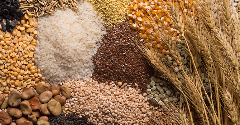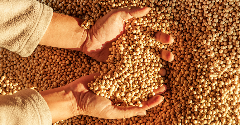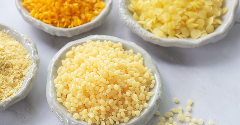News
Curcugreen shown to be effective with osteoarthritis
13 Jun 2019In a newly published human clinical study, Arjuna Natural curcumin formulation BCM-95 (Curcugreen) is said to have demonstrated new possibilities for effectively managing symptoms associated with osteoarthritis of the knee, and exhibited results that matched those of some of the non-steroidal anti-inflammatory drugs (NSAIDs) typically used for significantly reducing pain severity.
In addition, subjects in the study incurred none of the gastric side effects that can be associated with the use of NSAIDs. BCM-95 (Curcugreen) is a patented, high-potency turmeric extract developed by Arjuna.

Osteoarthritis (OA) of the knee normally occurs in people beginning at about age 40, the company notes. It can have considerable restrictive impact on physical activity, and is the fourth leading cause of disability. After age 60, an estimated 10% to 15% of all adults have some degree of OA. The increasing prevalence of OA has been attributed to an ageing population and rising cases of obesity. Pain is commonly noted as the key symptom driving individuals to seek medical care.
The randomized, open-label, parallel-arm study was led by Dhaneshwar Shep, Ph.D., et. al., at the City Care Accident Hospital, Parli Vaijnath, Maharashtra, India, and was published in the journal Trials last March. The study involved 139 participants suffering from knee osteoarthritis They were given either 500mg BCM-95 three times daily, or 50 mg Volteran (diclofenac), twice daily for 28 days.Within two weeks of treatment, BCM-95 (Curcugreen) demonstrated an ability to reduce pain and relieve joint stiffness with a secondary capacity to effect improvements in the daily functions of living, recreational sporting activity, and overall quality of life, all at a level similar to that achieved through the NSAID control. Curcumin’s therapeutic functions are essentially credited to its well-documented ability to suppress several pro-inflammatory cytokines and their release mediators.“BCM-95 curcumin could be a favourable alternative for people seeking relief from OA symptoms, especially those who are intolerant to the side effects of standard OTC drugs,” said Benny Antony, Joint Managing Director of Arjuna.In the same study, the BCM-95 group reported a significant reduction in episodes of flatulence (an unpleasant side effect common to some NSAIDs), and an anti-ulcerative effect of BCM-95 also was observed. None of the participants required heartburn drugs, such as the H2 blockers often prescribed alongside NSAIDs. Preclinical studies conducted on rats have previously demonstrated the gastroprotective properties of this anti-inflammatory polyphenolic compound used extensively in traditional Ayurvedic medicine.Arjuna says that this is the first study in which curcumin therapy has elicited a significant positive link to osteoarthriticcare. “The beneficial results obtained in the study are highly likely due to the combination of curcuminoids and essential oil of turmeric present in our proprietary curcumin formulation with increased curcumin bioavailability,” said Antony. “The permeability of curcumin is increased by the turmerone-rich essential oil complex, incurring a sevenfold enhancement of plasma curcumin levels, proven to yield statistically significant clinical benefits.”Related news

BelliWelli secures funding for retail and team expansion
2 Jan 2025
US fibre brand BelliWelli has confirmed a further $10 million series B investment from Invus. The investment will help the company further expand its presence in the US.
Read more
EU calls to harmonise allergen labelling increase
1 Jan 2025
Allergy awareness efforts focus on implementing a European reference laboratory and collaboration to standardise labels and support allergen identification.
Read more
Japanese study points to risk of excessive nutritional fortification
31 Dec 2024
Fortified foods and supplements are mainly beneficial but there is a small risk of over-supplementation – particularly for vitamin B6, a Japanese study has concluded.
Read more
Is it time for a global definition of whole grain?
30 Dec 2024
Amid a lack of harmonisation, the European Food Information Council (EUFIC) is calling for a global definition of the term whole grain to end consumer confusion.
Read more
EFSA publishes new food additive research on non-nutritive sweetener saccharine
27 Dec 2024
The European Food Safety Authority (EFSA) has released new recommendations on saccharin and its sodium, potassium and calcium salts (E 954) as food additives.
Read more
FDA delivers workshop on nutrition regulation and science
19 Dec 2024
The FDA hosted a nutrition regulatory science workshop exploring ultra-processed foods and emerging technologies, aiming to spotlight the relationship between nutrition, science, and evidence-based policies.
Read more
How US soy exports shape Southeast Asian food
19 Dec 2024
As Southeast Asia and the US mark 20 years of trade, trends in soy, especially plant-based preferences, signal increasing demand for high-quality protein sources.
Read more
Hormel Foods sells its Health Labs brands to Lyons Magnus
17 Dec 2024
Hormel Foods has confirmed the sale of its Hormel Health Labs division to Lyons Magnus, creating Lyons Health Labs. The strategic move aims to better position Lyons Magnus as a leading player in the growing US market for nutritional and health products...
Read more
Nestlé releases products for pregnancy and fertility
13 Dec 2024
Building on in-house research, existing scientific evidence, and consumer demands, the global food company has developed products designed for mothers and babies.
Read more
Consumer awareness and transparency key factors in shift to natural-based emulsifiers
11 Dec 2024
The demand for natural-based emulsifiers in the food industry is surging as health concerns over the use of synthetic emulsifiers have consumers looking for alternatives.
Read more